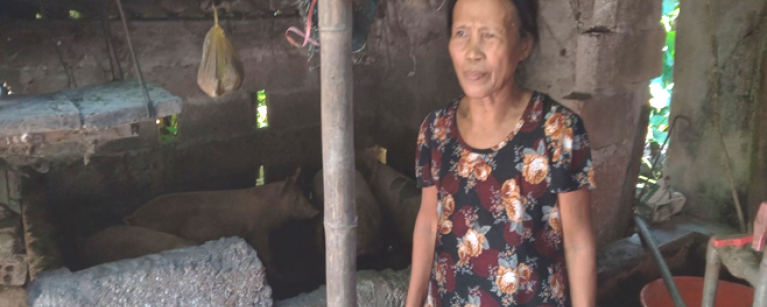“Previously, I could still do light jobs to earn a living. Sick as I was, I tried everything to provide for my daughter and grandchild. But since the pandemic started, no one hires anymore”
Mai Thi Cam, a poor female farmer from Giang Hai Commune in Thua Thien Hue Province, has faced considerable hardships since her youth. As a single mother, she raised her disabled daughter and later took on the care of her grandchild. Her life grew even more challenging when the COVID-19 pandemic broke out, severing her already sporadic income from odd jobs. “Previously, I could still do light jobs to earn a living. Sick as I was, I tried everything to provide for my daughter and grandchild. But since the pandemic started, no one hires anymore,” Cam recalled.
Aware of her family’s day-to-day struggle for survival, the local community and authorities extended their help. With some initial support of piglets and feed from a poverty aid program, she borrowed a little capital to start pig farming. At first, due to her lack of experience, she only made a profit of 600,000 VND per pig.
Then Cam received support from the “Restoring and enhancing resilient livelihoods after the COVID-19 pandemic for poor and near poor female farmers in disadvantaged communes in Thua Thien Hue province” project, funded by the New Zealand Government and implemented by Oxfam in collaboration with the Red Cross Society of Thua Thien Hue.
Cam participated in training courses on livestock management, where she learned skills in effective animal care, from constructing pens to selecting breeds and preventing diseases. With a cash grant of 3,200,000 VND from the project, she decided to purchase larger, vaccinated piglets, minimizing disease risks and increasing economic efficiency. By applying the knowledge gained from the training, Cam expected to earn a profit of about 3,000,000 VND from the four pigs she raised over four months. Though not a large sum, it provides the necessary boost to inspire and instill confidence in her.
With a gentle smile, Cam said: “I am grateful for the project. It helps my daughter and me have enough food to eat, clothes to wear, and money to buy medicine when we are sick. I am so happy!”
